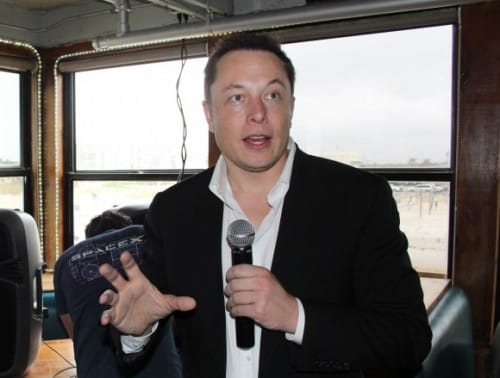"Either we will become a multi-planetary species and go out into the stars, or we will remain a species residing on a single planet until an extinction event - natural or man-made" said Musk in an interview with MSNBC

After revealing the manned spacecraft from the Dragon series, Elon Musk talks about the attempts to recover it for the purpose of reusing the first stage of the Falcon 9 launcher, something that has not yet been attempted.
Yesterday (June 18), Musk was interviewed on MSNBC, after his companies (SpaceX and Tesla) were named among the fifty disruptive companies of the year. We will bring the things he said related to space. Among other things, Musk said that he hopes to see humans walking on Mars within 10-12 years:
"A journey to Mars will be difficult, naturally. I hope that the first humans will be able to set foot on the Martian soil within 10-12 years. I believe this is possible. What is important in the long term is to establish a self-supporting city on Mars, to distribute life between the planets. This will split human civilization. Either we will become a multi-planetary species and go out to the stars, or we will remain a species residing on a single planet until an extinction event - natural or man-made."
"We have been trying to retrieve the missile launchers for 12 years and we haven't succeeded so far, but I feel that we are finally close to success, maybe in the next launch or the one after that, and then we will fly it again next year. Such success will lead to a significant change in missile technology."
Musk also addressed the question of what will happen if SpaceX does not obtain the funding in the next round of NASA allocations - so far SpaceX, Boeing and Sierra Nevada have received such allocations, but NASA has not yet decided how many companies will receive investments in the next round, which will be announced a year later. Musk also unveiled the manned Dragon spacecraft prototype in a fundraising round he held in late May.
"First, I want to acknowledge the critical role that NASA has played in the success of SpaceX. We could not have achieved this without NASA's help and it is possible that we may not win the commercial contract. We did everything we could on our part. We have a good design solution. If NASA does not choose us, because we are competing with old and established companies like Boeing, we will do our best to continue with our own money."
"Obviously, this will slow us down, but we will continue on the path and be able to launch commercial satellites, we still have an existing agreement with NASA to launch payloads to and from the space station. We will continue but it will only be slower."
When asked an open question - what in his opinion will be a disruptive technology that will change our lives, after presenting the Tesla electric car, and innovations in space travel, Musk said: "A significant change in life expectancy. I'm not just talking about curing cancer, if you cure cancer, the average life expectancy of the population will increase by two years from 80 to 82 or something like that. We simply have a lifespan determined by genetics. It's like taking a fruit fly, making sure it gets the best physical training and the best possible nutrition for a perfect life, it might live four weeks instead of three. Genetics simply dictates a lot of things, so for any technology to be a disruptive technology on this front, something has to be done with genetics. Unfortunately, I am not involved in this field."

5 תגובות
Miracles,
Yes I understand that this is what was originally said ("destructive technology" which sounds even worse) I'm just saying that the terminology itself sounds stupid to me. Why not say "breakthrough technology", or "innovative technology"? Doesn't that sound a little better?
Not every term that some professor invented should immediately become part of the language.
rival
In English they say disruptive technology, which is a technology that changes the market. They probably couldn't find a better translation.
First time I come across this strange term "disruptive technology", it sounds like something negative. I would instead use somewhat more sympathetic terms like "innovative technology", or "breakthrough technology", it sounds better.